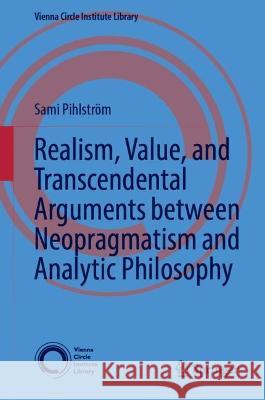Realism, Value, and Transcendental Arguments between Neopragmatism and Analytic Philosophy » książka
Realism, Value, and Transcendental Arguments between Neopragmatism and Analytic Philosophy
ISBN-13: 9783031280412 / Angielski
Realism, Value, and Transcendental Arguments between Neopragmatism and Analytic Philosophy
ISBN-13: 9783031280412 / Angielski
(netto: 421,70 VAT: 5%)
Najniższa cena z 30 dni: 424,07
ok. 16-18 dni roboczych.
Darmowa dostawa!
The essays collected in this volume and authored by Sami Pihlström emphasize that our relation to the world we live in and seek to represent and get to know better through our practices of conceptualization and inquiry is irreducibly valuational. There is no way of even approaching, let alone resolving, the philosophical issue of realism without drawing due attention to the ways in which human values are inextricably entangled with even the most purely “factual” projects of inquiry we engage in.This entanglement of the factual and the normative is, as explicitly argued in Chapter 7 but implicitly suggested in all the other chapters as well, both pragmatic (practice-embedded and practice-involving) and transcendental (operating at the level of the necessary conditions for the possibility of our representing and cognizing the world in general). The author claims we need to carefully examine the complex relations of realism, value, and transcendental arguments at the intersection of pragmatism and analytic philosophy. This book does so by offering case-studies of various important neopragmatists and philosophers close to the pragmatist tradition, including Hilary Putnam, Nicholas Rescher, Joseph Margolis, and Ludwig Wittgenstein. It appeals to scholars and advanced graduate students focusing on pragmatism and analytic philosophy.
The essays collected in this volume and authored by Sami Pihlström emphasize that our relation to the world we live in and seek to represent and get to know better through our practices of conceptualization and inquiry is irreducibly valuational. There is no way of even approaching, let alone resolving, the philosophical issue of realism without drawing due attention to the ways in which human values are inextricably entangled with even the most purely “factual” projects of inquiry we engage in.This entanglement of the factual and the normative is, as explicitly argued in Chapter 7 but implicitly suggested in all the other chapters as well, both pragmatic (practice-embedded and practice-involving) and transcendental (operating at the level of the necessary conditions for the possibility of our representing and cognizing the world in general). The author claims we need to carefully examine the complex relations of realism, value, and transcendental arguments at the intersection of pragmatism and analytic philosophy. This book does so by offering case-studies of various important neopragmatists and philosophers close to the pragmatist tradition, including Hilary Putnam, Nicholas Rescher, Joseph Margolis, and Ludwig Wittgenstein. It appeals to scholars and advanced graduate students focusing on pragmatism and analytic philosophy.











